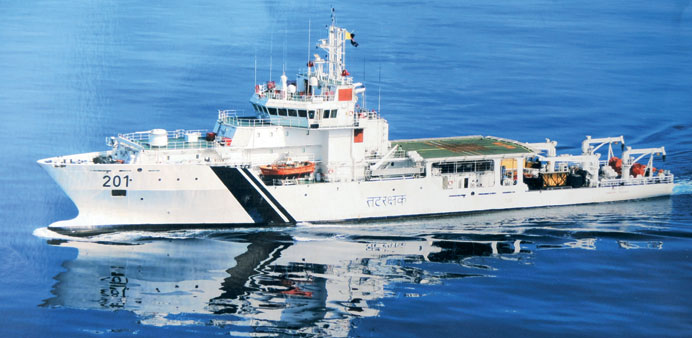By Ramesh Mathew/Staff Reporter
The state-of-the-art anti-marine pollution carrier of the Indian Coast Guard, Samudra Prahari, is berthed at the Doha Port as part of its first journey outside the Indian territorial waters.
The visit, said Indian ambassador to Qatar Sanjiv Arora, is meant to demonstrate his country’s keenness to strengthen relations with the GCC states, in particular Qatar, in different areas of mutual interest.
Speaking on board the ship yesterday, the envoy said the vessel is one of the rarest of its kind in terms of the areas in which its services are utilised. The decision of the Indian Coast Guard authorities to choose this region as its first overseas destination is a major recognition for the GCC states that the ship is touring at present, he added.
The ship, which was berthed in Abu Dhabi for a few days, arrived in Doha on Saturday and would remain here until tomorrow evening as part of a four-day visit to Qatar.
While lauding the team leader, deputy inspector-general Donny Michael, and his nearly 125-member team of officials and sailors, Arora said fruitful talks had been held between the defence officials of the two countries on several issues of mutual interest since Indian Prime Minister Manmohan Singh’s visit to Qatar in November 2008. The arrival of Samudra Prahari added another chapter to the growing relationship between Qatar and India, he pointed out.
While representatives of the country’s Indian groups were taken on a tour of the vessel yesterday evening, the ship’s personnel would receive children from some Indian expatriate schools today.
According to Michael, Samudra Prahari is the first ship in the entire South Asia and South East Asia to be equipped with anti-marine pollution response and control equipment. It is designed to carry one twin ALH/Chetak helicopter, five speedboats and four water scooters for search and rescue operations, maritime law enforcement, exclusive economic zone surveillance and high-speed interdiction.
Michael said in the past two years since its commissioning in October 2010, the vessel has been deployed - among other purposes - for four pollution response and rescue operations, including a major fire at the Bombay High oil platform. It has saved as many as 36 lives till date. The ship has remained at sea for more than 5,600 hours and traversed over 61,000 nautical miles.
Explaining its features, the team leader said only 18-19 vessels in the world have the kind of equipment that Samudra Prahari possesses.
The DIG said key discussions were held between the two sides on a wide range of issues during the visits of Indian defence officials to the region, and India was only too happy with the growing level of contact with the Coast Guard of Qatar. “Our Coast Guard’s facilities are some of the best of their kind and we are well equipped to provide expertise to the local Coast Guard teams, who have some of the finest equipment in their possession,” he said, adding that Samudra Prahari was indigenously built at a shipyard in Surat, Gujarat.
Michael said India has signed MoUs to share maritime knowledge and information with South Korea, Japan, Oman and Sri Lanka, and is looking forward to enhance its co-operation with defence teams in the region through similar deals.
From Doha, the vessel will proceed to Bahrain, with Oman being the final destination.
Also present at the meeting were India’s defence adviser (Qatar, UAE and Oman) at the Indian embassy in Muscat, Capt Arjun Dev Nair, and second secretary at the embassy in Doha, Suman Sharma.

The Indian Coast Guard’s anti-marine pollution vessel, Samudra Prahari. The state-of-the-art ship will remain berthed at the Doha Port until tomorrow.
